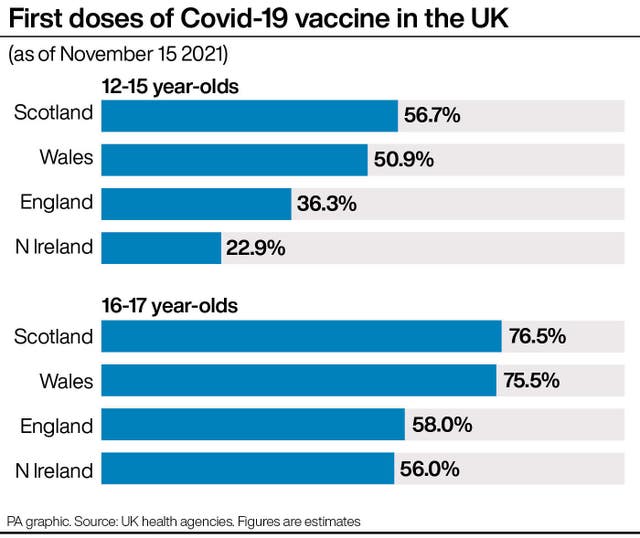Children who have had Covid-19 should wait 12 weeks for vaccine, experts say
Officials wanted to highlight guidance which clarified when children should get a jab after a natural infection.

Children aged 12 and over who have had a Covid-19 infection should not get a vaccine until 12 weeks later, officials have said.
Deferring could help to reduce even further the “very, very small” risk of heart inflammation after vaccination, experts from the UK Health Security Agency (UKHSA) said.
The current case rates of myocarditis after vaccination among under-18s are suspected to be around nine per million vaccinations and cases have been “relatively mild”, officials said.
Officials wanted to highlight guidance which clarified when children should get a jab after a natural infection.

The current advice for older people and for people at high risk of Covid-19 – including those aged 12 and over – is that they should wait four weeks between Covid infection and having a dose of vaccine.
But officials said this should be extended to 12 weeks in lower-risk children between 12 and 17.
The guidance comes amid high infection rates among younger age groups.
And the new advice could mean that the vaccination programme is slowed slightly.
It is thought that a natural Covid-19 infection in younger people provides them with “at least” three months’ protection and could extend to six months.
On Monday, the Joint Committee on Vaccination and Immunisation (JCVI) said 16 and 17-year-olds could book their second Covid-19 vaccine 12 weeks after their first.
But the UKHSA said that should teenagers in this age group be infected with Covid-19 after their first dose, they should then delay the second dose until 12 weeks after the infection.
Those still waiting to book their first dose who have had a natural infection should also delay for 12 weeks.
The JCVI has not yet advised on second jabs for healthy 12 to 15-year-olds.
Officials estimate that around half of secondary school pupils have had Covid.
They said that children should only stick to the 12-week deferral if they have had a confirmed case.
Experts reiterated that the risk of myocarditis and other side effects is “largely in the first few days”, adding: “So if people had that vaccine three or four weeks ago, within a month of them having had previous infection, and are now fine, they can be reassured they’re past that period of potential risk.”
Any youngster who had the jab in the last few days would have been given information about potential side effects and what to look out for, they added.
“Within a few days, everyone will have moved through that risk period so hopefully we can reassure people,” a senior official close to the programme said.
From Thursday, vaccination workers will start doing verbal checks to assess whether children have had a confirmed natural infection within the last 12 weeks.
People are encouraged to get their jab even if they have had previous infection to get as much protection as possible.
Researchers from the Covid Zoe Symptom study said that infection before double vaccination provides much greater protection, which supports the call for everyone to get vaccinated even if they have already had Covid.
Dr Mary Ramsay, head of immunisations at UKHSA, said: “The Covid-19 vaccines are very safe.
“Based on a highly precautionary approach, we are advising a longer interval between Covid infection and vaccination for those aged under 18.
“This increase is based on the latest reports from the UK and other countries, which may suggest that leaving a longer interval between infection and vaccination will further reduce the already very small risk of myocarditis in younger age groups.
“Young people and parents should be reassured that myocarditis is extremely rare, at whatever point they take up the vaccine, and this change has been made based on the utmost precaution.
“We keep all advice under constant review and will revise it according to the latest data and evidence.”





